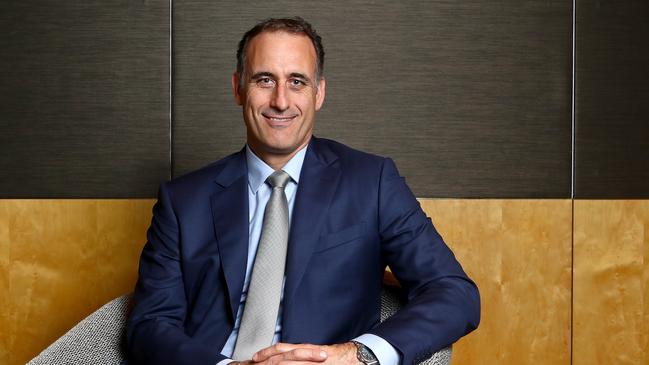Wesfarmers CEO Rob Scott’s warning on franking
Wesfarmers chief executive Rob Scott has questioned the timing of Labor’s plan to limit franking credit payments.

Wesfarmers chief executive Rob Scott has questioned the timing of Labor’s plan to limit franking credit payments, warning against policies that crimp household disposable income in the face of a slowing economy.
Mr Scott said the ALP’s policy to cut excess franking credits on shares would remove funds that were relied upon by many Australians to fund their retirement.
Mr Scott, who oversees a company that owns leading retail chains Bunnings, Kmart and Target, said policymakers must be mindful about cost pressures facing consumers in the lead-up to the election, and not make things worse by further crimping incomes.
“We will start to hear in coming months about a range of policies from all political parties and I guess what I am saying is it is very easy to look at one policy in isolation, but I think it’s important we consider the impact of a number of different policies,’’ Mr Scott told The Australian.
“So there is a whole lot of policies relating to tax, obviously franking credits, and I think we just need to be mindful at a time when consumers are under a bit of pressure — cost of living increases, real wages growth has been relatively modest, concerns around housing and access to credit,” Mr Scott said.
“I think now is the time that when setting policies we should be mindful about the impact it can have on consumers and the impact it will have on business investment,” he said.
His comments came as influential Westpac chief economist Bill Evans yesterday tipped the Reserve Bank would cut official rates twice this year to a new record low of 1 per cent to bolster a faltering economy.
Westpac is the first major bank to predict a rate cut, after a series of events over the summer dampened the local and international economic outlook.
Mr Evans expected house prices in Sydney and Melbourne to fall a further 5 to 10 per cent this year, which would scare consumers into shutting their wallets.
In a busy day of earnings results yesterday Flight Centre folded to shareholder pressure and brought forward the payment of $211 million in special dividends on top of its interim dividend, to beat Labor’s planned changes to franking credits from July 1.
“There’s a reasonable chance some of the ability to cash-back the franking credits if Labor gets in will disappear,” Mr Turner told The Australian yesterday.
Proposed Labor tax policies include raising $60 billion over 10 years by eliminating excess franking credit refunds as well as scrapping negative gearing.
Labor’s Treasury spokesman Chris Bowen has said the federal government can’t afford to spend as much on franking credits as it does on public schools.
The franking policy has triggered uproar from shareholders and corporate leaders. Billionaire investor Robert Millner has raised concerns that Labor’s policy could create two classes of investors, while Liberal Party stalwart, former ANZ and Woodside Petroleum chair Charles Goode, described the policy as “flawed and unfair” and said it would hurt self-funded retirees.
The chief executive of Westpac’s BT wealth business, Brad Cooper, said the “retrospective nature” of Labor’s planned changes were hurting confidence in super.
“When people start to prepare for retirement they want to have confidence that rules are stable and won’t be reversed at some later point,” he said. “It’s hard to see how these changes are improving outcomes; they are wealth redistribution-led and budgetary-led as opposed to meeting any sort of objective,” he told a self-managed super fund conference in Melbourne’s yesterday.
The Coalition argues Labor’s policies will damage the Australian economy and that $200 billion of new taxes will dent consumer spending and constrict business investment.
Labor’s franking credits policy has become a key election battleground, with the government arguing as many as 800,000 retirees could suffer.
Mr Scott said yesterday that while the market would adjust to the franking credits scheme, he agreed that Australians who relied on franking refunds for income — mostly retirees and pensioners — would see their disposable income fall. “I think it’s important to note that before 2000 this (excess franking) refund wasn’t available, so at end of the day the market will adjust and we will adjust, and franked dividends will continue to be of great value for a majority of shareholders.
“So I guess in terms of the policy, in isolation I don’t think it is the end of the world, but I think what needs to be considered is the policy in the light of a whole lot of other policies that could dampen consumer spending, because clearly there are a number of people who rely on those credits — that is part of their income and influences spending.
“I wouldn’t get too hung up on that policy in isolation, but we need to consider the broader set of policies and what impact it might have on household spending going forward.’’
Mr Scott said election promises needed to be viewed through any potential threat to the household budget, with consumers already feeling the strains of rises in the cost of living.
“We need to be mindful the impact of any policy changes are going to make their lives even harder, and I think that is stating the obvious.’’




To join the conversation, please log in. Don't have an account? Register
Join the conversation, you are commenting as Logout